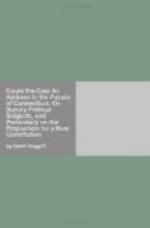These reformers, under the specious pretext of exercising unbounded liberality in matters of religion, become intolerant to all who differ from them, charging the professors of christianity with breathing out a spirit of persecution, they become the most furious persecutors, and while they affect to possess great moderation and candor towards all denominations of Christians, they clearly evince that they would grant indulgence or protection to none. On the other hand a great majority of the people and the Legislature, insist that every man in the community who is able, should contribute, in some way, towards the support of the institutions of religion. No wish is entertained to legislate in matters of faith, or to establish one sect in preference to another. Our laws permit every man to worship God when, where, and in the manner most agreeable to his principles or to his inclination, and not the least restraint is imposed; all ideas of dictating to the conscience are discarded, and every man “sits under his own vine and fig tree.” Our laws only enforce the great principle abovementioned that the members of the community should contribute towards the support of these institutions, as means to promote the prosperity of the people in the same manner as they provide for the public accommodation, peace and happiness, by the maintenance of the roads and bridges, the organization of the militia, and the support of schools of instruction. Should objections be urged by any individuals that they cannot conscientiously contribute to the promotion of these objects, their objections would be disregarded. There is a class of men, very respectable for the sobriety of their habits, and their peaceful deportment, who always refuse to be taxed for military defence. No one doubts that in their opposition, they are conscientious, and yet few doubt the propriety of enforcing such taxes.
The principle now advocated is interwoven with all our laws and habits —it has existed from the first settlement of the State—it has produced much good—it ought not therefore to be abandoned without the utmost deliberation. The clamor against this principle, is the clamor of those who wish to see the State revolutionized—it is the clamor of those turbulent spirits which delight in confusion and which pull down and destroy with a dexterity which they never shew in building up. Let the sober citizens of Connecticut look at the authors of this clamor—Let them view such men as Abraham Bishop, and eye the path which they have trodden from their youth, and then ask their own hearts, if they are not under some apprehension, lest if they should enlist under such leaders and fight their cause, they may be found contending against the best interests of society, and “fighting against God.”




